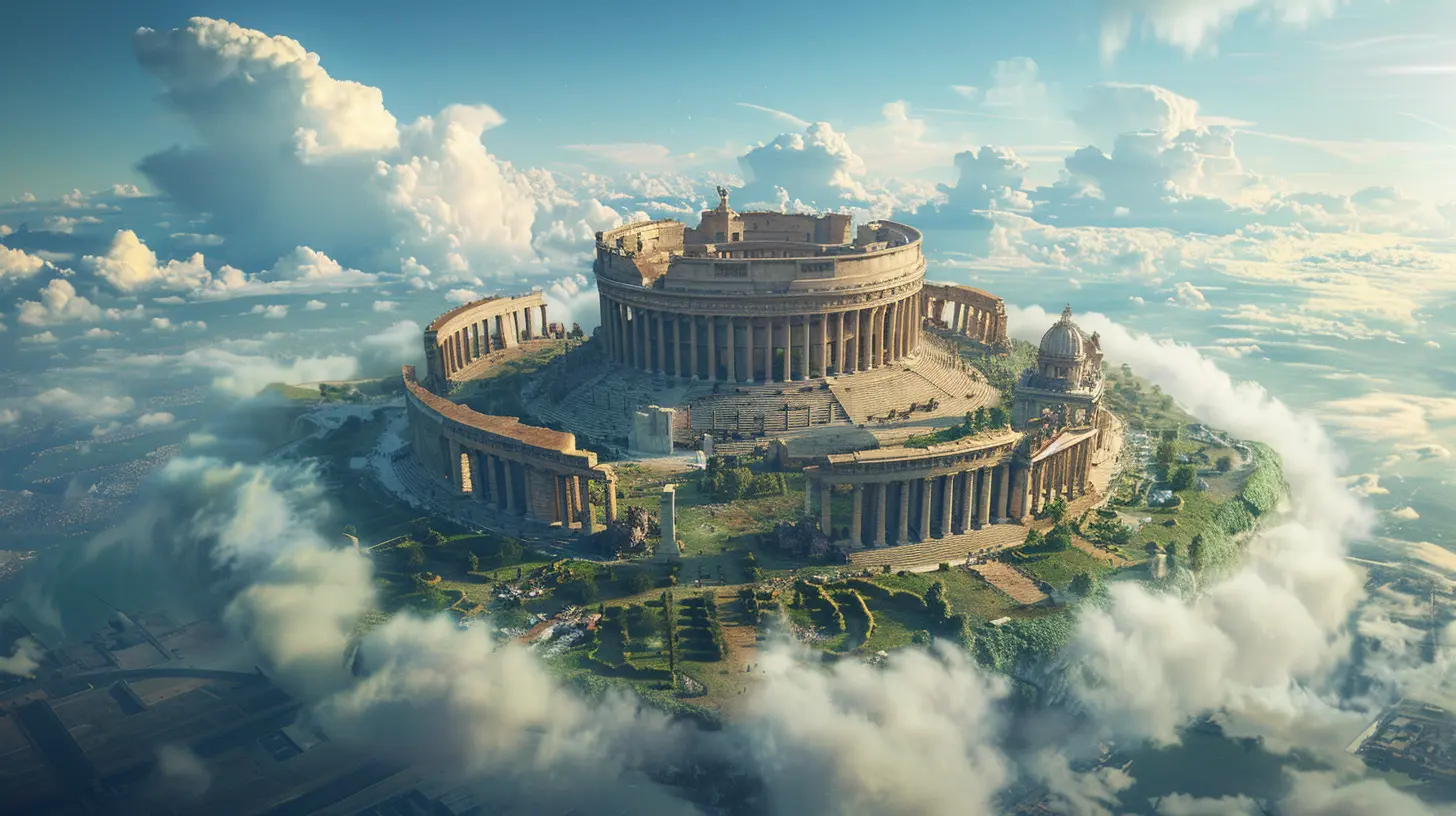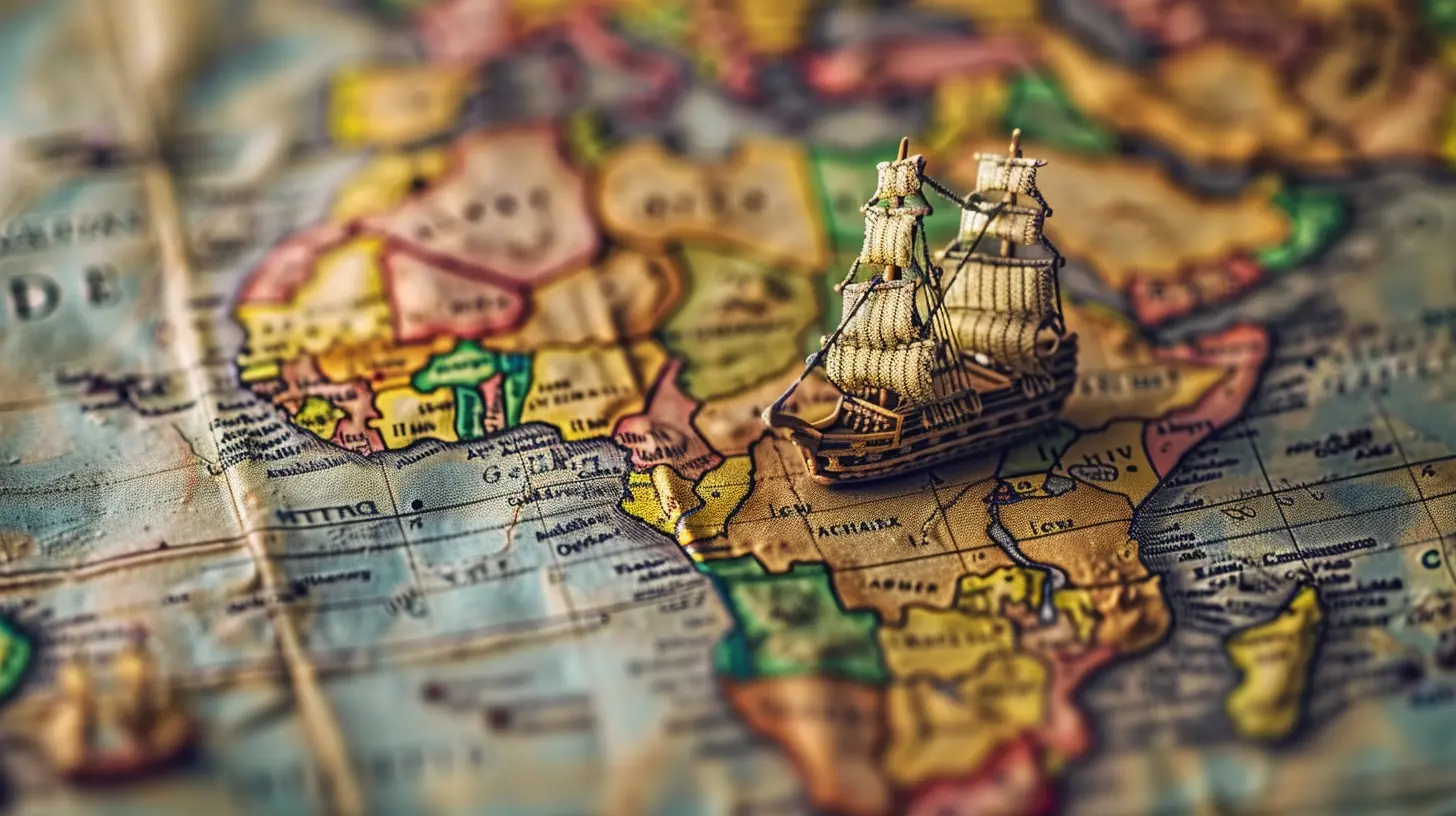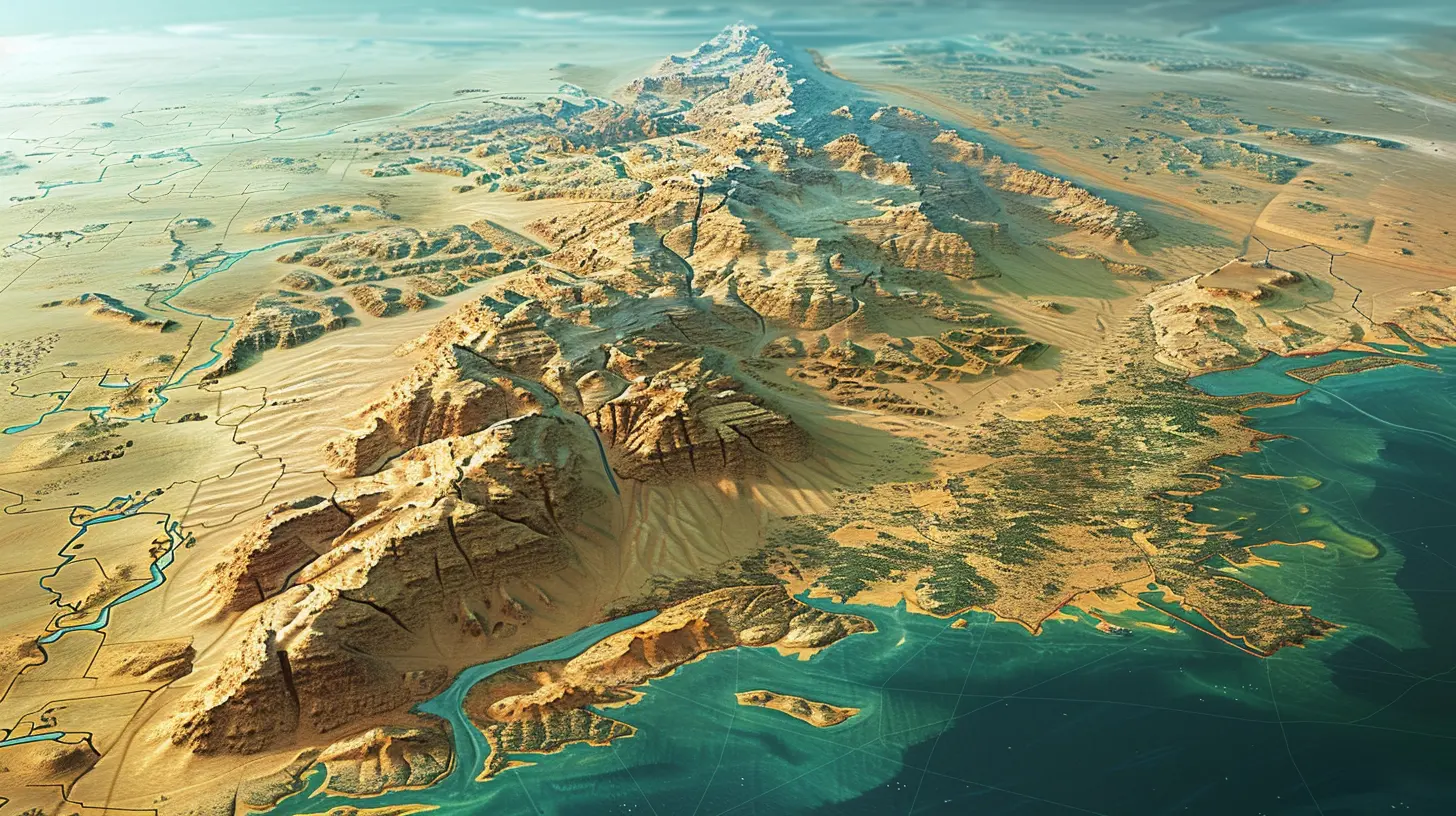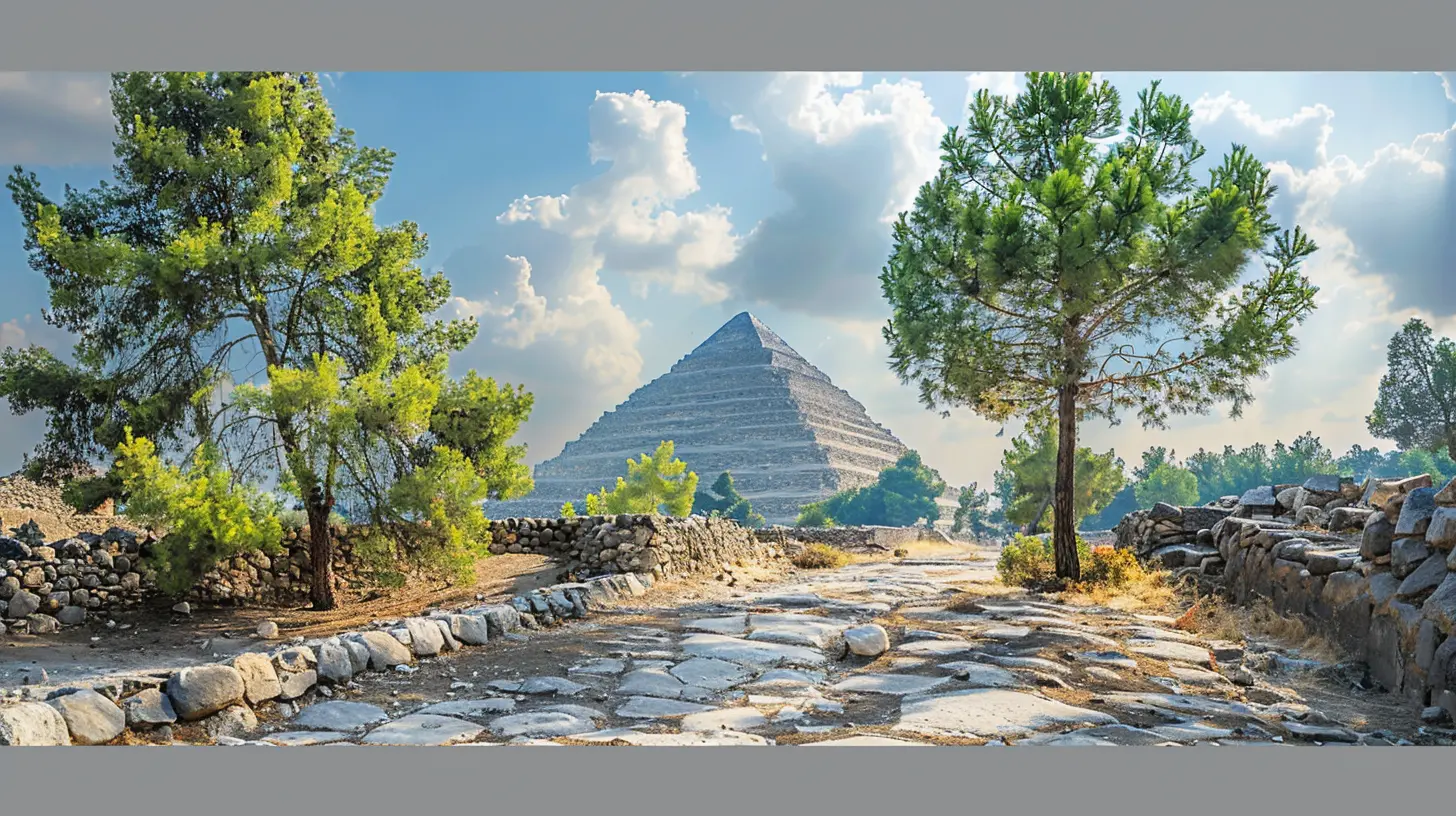How Geography Shaped Ancient Civilizations
1 March 2025
Have you ever wondered why ancient civilizations popped up where they did? Think about it for a second – the pyramids of Egypt, the bustling trade hubs of Mesopotamia, the sprawling cities of ancient China. These weren't just random dots on a map. Geography was like the invisible hand guiding the course of history, shaping the rise and fall of civilizations.
The Earth's landscape – its mountains, rivers, deserts, and seas – wasn't just a backdrop for these civilizations. It was an active player! Geography determined where people settled, what they ate, how they traded, and even how they fought. In this article, we’ll explore how geography influenced ancient civilizations in surprising and significant ways.

The Role of Geography in Human Settlement
Rivers: The Lifeblood of Early Civilizations
Why did so many ancient civilizations spring up near rivers? It’s simple – water is life. Rivers provided a fresh, reliable source of drinking water, essential for both humans and animals. But that’s not all. Rivers also made agriculture possible, and agriculture is the foundation of any stable society.Take the Nile River in Egypt. This mighty river not only provided water but also helped farmers grow crops thanks to its annual flooding. When the Nile flooded, it deposited nutrient-rich silt on the surrounding land. This fertile soil was perfect for growing wheat, barley, and other essential crops. Without the Nile, Egypt wouldn’t have been the thriving civilization it became.
Similarly, the Tigris and Euphrates Rivers in Mesopotamia (modern-day Iraq) helped create one of the earliest human civilizations. The fertile land between these two rivers was so lush and productive that it became known as the "Fertile Crescent." This area is often called the "Cradle of Civilization" because it’s one of the first places where humans developed cities, writing, and government structures.
Mountains: The Barriers and Protectors
Mountains could either be your best friend or your worst enemy in ancient times – sometimes both. On one hand, they acted as natural barriers, protecting civilizations from invasions. For instance, the Himalayas shielded ancient China from the aggressive nomadic tribes of Central Asia. This allowed Chinese civilization to develop in relative peace for centuries.On the other hand, mountains could also isolate civilizations. For example, the Andes Mountains played a huge role in shaping the Incan Empire in South America. The Incas built their cities high up in the mountains, but this also meant they had to develop unique farming techniques, like terracing, to grow crops on the steep slopes. The Andes isolated the Incas, but it also protected them, allowing their empire to flourish.
Deserts: The Great Divide
Deserts were often seen as impassable wastelands, but they weren’t always a bad thing. In fact, deserts helped shape the boundaries of many ancient civilizations.Take the ancient Egyptians again. The Sahara Desert acted as a natural barrier, protecting them from invaders. It was incredibly difficult for armies to cross the vast, harsh terrain of the desert, which kept Egypt relatively safe for centuries. At the same time, the desert wasn’t entirely useless. It was full of valuable resources, like gold and salt, which later became important trade commodities.
But deserts could also pose challenges. Ancient Mesopotamia didn’t have the luxury of a natural desert barrier, which meant it was more vulnerable to invasions. The open plains surrounding the cities made them easy targets for wandering nomads and aggressive neighbors.

The Impact on Trade and Economy
Seas and Oceans: Highways of the Ancient World
Imagine trying to move goods over land in ancient times. It wasn’t easy! Roads were often little more than dirt paths, and transporting goods by cart or donkey was slow and expensive. That’s why many ancient civilizations turned to the seas.Take the Mediterranean Sea, for example. It was a lifeline for several ancient civilizations, including the Greeks, Romans, and Phoenicians. The Mediterranean wasn’t just a body of water; it was a highway of trade. Ships could easily transport goods like grain, wine, olive oil, and metal across vast distances. This facilitated the rise of powerful trade empires and interconnected economies.
The Indian Ocean was another major trade route. Ancient civilizations in India, Arabia, and East Africa traded valuable goods like spices, textiles, and ivory across the ocean. The seasonal monsoon winds even made it easier to sail across the ocean, as sailors could plan their journeys based on the predictable wind patterns.
Land Routes: The Silk Road and Beyond
Sometimes, water wasn’t an option, and civilizations had to rely on land routes for trade. The most famous of these routes is the Silk Road, which connected China to the Mediterranean and everything in between. This vast network of trade routes allowed for the exchange of goods like silk, spices, and precious metals.But it wasn’t just goods that traveled along these routes. Ideas, technologies, and even religions spread as well. Buddhism, for example, spread from India to China along the Silk Road. This intermingling of cultures and ideas helped shape the ancient world in ways that still influence our lives today.
However, land-based trade wasn’t always easy. Traders had to deal with harsh terrains, like deserts, mountains, and forests, not to mention the constant threat of bandits. Geography made trade both an opportunity and a challenge for ancient civilizations.

Geographic Influence on Military Strategy
Natural Defenses: Rivers, Mountains, and Deserts
Geography didn’t just influence where people lived and traded – it also played a massive role in how they fought. Natural features like rivers, mountains, and deserts often acted as strategic defenses.Take Rome, for example. The city of Rome was built on seven hills, which gave it a natural defensive advantage. Invaders would have to fight uphill to reach the city, which made it easier for the Romans to defend their home. Similarly, the Alps protected Italy from invasions from the north, making it harder for enemies to march on Rome.
The Great Wall of China is another example of geography influencing military strategy. The wall was built along the northern borders of ancient Chinese states to protect against invasions from nomadic tribes. The geography of northern China, with its plains and deserts, made it an ideal spot for building such a massive defensive structure.
Expansion and Conquest
Geography also played a role in determining how far ancient civilizations could expand. For instance, the Roman Empire was able to conquer vast territories thanks to its location in the Mediterranean. The sea allowed the Romans to quickly move troops and supplies to different parts of the empire.However, geography could also limit expansion. The Persian Empire, for example, struggled to conquer the Greek city-states because of the mountainous terrain of Greece. The narrow mountain passes and rugged landscape made it difficult for the Persian army to maneuver, ultimately leading to their defeat in several key battles.

The Cultural and Religious Impact of Geography
Sacred Landscapes
Geography didn’t just affect the practical aspects of life – it also shaped the spiritual beliefs of ancient civilizations. Many cultures saw their landscapes as sacred and believed that gods or spirits inhabited certain mountains, rivers, or forests.For example, the ancient Egyptians saw the Nile River as a divine gift from the gods. They believed that the annual flooding of the Nile was a sign of the gods’ favor, and many of their religious practices revolved around ensuring the continued fertility of the land.
Similarly, the Greeks believed that their gods resided on Mount Olympus, the highest mountain in Greece. This mountain became a central part of Greek mythology, and many of their religious ceremonies were held in its shadow.
Isolation and Cultural Development
In some cases, geography led to the isolation of civilizations, which allowed them to develop unique cultures and traditions. The Japanese archipelago, for example, is surrounded by water, which kept Japan relatively isolated from mainland Asia for much of its history. This isolation allowed Japan to develop its own distinct culture, language, and religious practices, such as Shintoism.On the other hand, some civilizations were more influenced by their geographic neighbors. The ancient Greeks and Romans were in close contact with each other, and as a result, their cultures heavily influenced one another. The spread of Greek philosophy, art, and architecture throughout the Roman Empire is a prime example of how geography can lead to cultural fusion.
Conclusion: Geography as the Unsung Hero of History
It’s easy to overlook geography when we think about ancient civilizations. We often focus on the kings, battles, and monuments, but the truth is, geography was the silent force behind it all. Rivers, mountains, deserts, and seas weren’t just part of the scenery – they were the stage upon which history unfolded.Geography determined where people lived, how they traded, how they fought, and even what they believed. It shaped the rise and fall of empires, the spread of ideas, and the development of cultures. In many ways, geography was the unsung hero of ancient civilizations, guiding them in ways that continue to affect us today.
all images in this post were generated using AI tools
Category:
History LessonsAuthor:

Zoe McKay
Discussion
rate this article
17 comments
Meredith Thomas
Geography's impact is undeniable here.
April 3, 2025 at 11:43 AM

Zoe McKay
Thank you! Geography indeed played a crucial role in shaping the development, trade, and culture of ancient civilizations.
Maura Barron
Great article! It's fascinating to see how geography influenced ancient civilizations. Remember, every place has a story and shape—just like each of us has our own unique journey!
March 31, 2025 at 11:17 AM

Zoe McKay
Thank you! I'm glad you enjoyed the article and appreciate your insightful perspective on geography and personal journeys.
London Maddox
Geography significantly influenced resources, culture, and development in ancient civilizations' evolution.
March 26, 2025 at 1:23 PM

Zoe McKay
Absolutely! Geography played a crucial role in shaping resources, cultural practices, and the overall development of ancient civilizations, influencing everything from trade routes to agricultural practices. Thank you for your insight!
Yasmine McKinnon
What a fascinating journey through time! It's incredible to see how mountains and rivers shaped the lives of ancient civilizations. Remember, just like them, we can navigate our own paths and make a mark on the world! Keep exploring!
March 23, 2025 at 5:25 AM

Zoe McKay
Thank you! I'm glad you enjoyed the article. Indeed, geography has profoundly influenced human history, and it's inspiring to think about how we can shape our own paths today!
Evren McKeever
Maps: Nature’s ancient treasure map!
March 22, 2025 at 11:33 AM

Zoe McKay
Absolutely! Maps captivate our understanding of ancient civilizations, revealing how geography influenced trade, culture, and settlement patterns. They're key to uncovering our past!
Tristan Myers
Geography profoundly influenced ancient civilizations; understanding this helps us appreciate their incredible legacies today!
March 21, 2025 at 9:36 PM

Zoe McKay
Absolutely! Geography played a crucial role in shaping cultures, economies, and interactions, which is key to appreciating the legacies they left behind. Thank you for your insight!
Morgan McGinnis
This article beautifully highlights the connection between geography and the rise of ancient civilizations! It’s fascinating to see how landscapes influenced culture, trade, and society. Can't wait to dive deeper into this topic!
March 20, 2025 at 7:27 PM

Zoe McKay
Thank you for your kind words! I'm glad you found the connection between geography and ancient civilizations compelling. Enjoy your exploration!
Ruby Torres
Understanding how geography influenced ancient civilizations reveals the incredible adaptability and resilience of humanity. Let's draw inspiration from the past to shape a brighter, united future together!
March 19, 2025 at 8:59 PM

Zoe McKay
Thank you for your thoughtful comment! Indeed, geography played a crucial role in shaping ancient civilizations, and learning from these historical lessons can inspire a more united future.
Kassidy Middleton
Fascinating piece! It’s intriguing to consider how mountains, rivers, and climate influenced not just the survival of ancient civilizations but their culture and governance as well. How do you think modern geography continues to shape societies today?
March 18, 2025 at 8:31 PM

Zoe McKay
Thank you! Modern geography still significantly shapes societies through resource distribution, trade routes, and climate challenges, influencing everything from economic development to cultural interactions.
Zephyra Horne
This article sparks my curiosity about the intricate relationship between geography and the development of ancient civilizations. How did specific geographical features influence cultural practices and societal structures? I’m eager to learn more about these connections!
March 18, 2025 at 12:19 PM

Zoe McKay
Thank you for your enthusiasm! Geography greatly influenced ancient civilizations by determining resources, trade routes, and settlement patterns, which in turn shaped cultural practices and societal structures. I encourage you to explore specific examples in the article for deeper insights!
Beau Ward
In the cradle of mountains and rivers wide, Civilizations blossomed, their destinies tied. Geography whispers tales of the past, Where land and spirit weave legacies vast. Nature's canvas, history's guide.
March 18, 2025 at 4:02 AM

Zoe McKay
Thank you for your poetic reflection! Geography indeed plays a crucial role in shaping civilizations, influencing their growth, culture, and legacies.
Mackenzie Kirkland
Ah, yes, because nothing says “great civilization” like a strategic river and a couple of mountains. Who needs innovation when you can just sit by a water source and watch your neighbors struggle? Truly, geography is the real MVP of human achievement!
March 17, 2025 at 1:07 PM

Zoe McKay
Geography is indeed a critical factor in shaping civilizations, influencing resources, trade, and cultural development. While innovation is vital, the environment sets the stage for success.
Arden Chapman
Geography: the original GPS guiding ancient civilizations to avoid awkward neighbors!
March 15, 2025 at 9:41 PM

Zoe McKay
Absolutely! Geography not only determined settlement patterns but also influenced trade routes and interactions, helping civilizations navigate both resources and relationships.
Ulysses Whitaker
What a fun exploration of how geography shaped our world! It’s amazing to see how mountains, rivers, and climate influenced ancient civilizations. Let’s keep learning from these fascinating connections and appreciate how our landscapes continue to shape us today. Here’s to the adventure of discovery! Keep it up! 🌍✨
March 11, 2025 at 5:25 AM

Zoe McKay
Thank you! I’m glad you enjoyed the exploration of geography’s impact on ancient civilizations. Here’s to ongoing discovery! 🌍✨
Misty Nguyen
Geography's influence on culture is undeniable.
March 10, 2025 at 2:02 PM

Zoe McKay
Absolutely! Geography played a crucial role in shaping resources, trade routes, and societal structures, profoundly influencing the cultures of ancient civilizations.
Ariella Hudson
This article offers a fascinating exploration of how geography influenced the development of ancient civilizations. I'm curious—what specific geographical features had the most profound impacts on cultural practices and societal structures? It’s intriguing to think about the interplay between land and life!
March 9, 2025 at 11:49 AM

Zoe McKay
Thank you for your interest! Key geographical features like rivers, mountains, and deserts significantly impacted resource availability, trade routes, and agricultural practices, shaping cultural and societal developments in ancient civilizations.
Ziva Dillon
Geography: the ultimate trendsetter for ancient civilizations! From rivers to mountains, it seems even the past needed a good landscape to throw the best parties. Who knew earth could be such a social planner?
March 6, 2025 at 9:47 PM

Zoe McKay
Absolutely! Geography played a crucial role in shaping ancient civilizations, influencing everything from trade to culture. It's fascinating how landscapes can dictate the rise and fall of societies!
MORE POSTS

Communicating with Confidence in Interviews

Writing with Purpose: How to Stay Focused

How to Use Tone Effectively in Professional Conversations

Setting Realistic Expectations for Your Child’s Academic Progress

Collaborative Learning: Engaging Parents and Children Together

Creative Writing Prompts to Spark Imagination

How to Advocate for Your Gifted Child in the School System

How Leaders Can Improve Teacher Wellbeing and Retention

How to Create Interactive Lessons for Virtual Classrooms

Unlocking the Power of Descriptive Writing

Adapting to Different Learning Styles in Online Courses